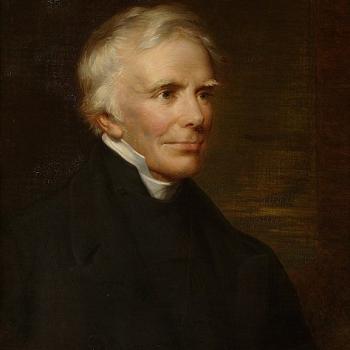
This is one of a series of extensive excerpts (with my occasional commentary) from The Catholic Controversy (1596): a classic of Catholic apologetics (originally a collection of pamphlets), written by St. Francis de Sales (1567-1622): a Doctor of the Church [see all the installments by searching “Salesian Apologetics #” on my blog sidebar search function]. Any comments of mine (apart from lists of related links) will be in blue. The rest is from the online, public domain text (3rd revised edition, New York: Benziger Brothers, 1909; translated by Henry Benedict Mackey, O.S.B.).
What I present is an edited abridgment, designed for modern readers: so I will dispense with the constant tedious use of ellipses (“. . .”). I will cite the section of the book used, so that anyone who desires it may consult the full text and/or particular contexts, patristic references (which I omit), etc. I will follow the custom of my paperback TAN Books edition: of italicizing scriptural passages.
*****
Part II, Article II: Chapter 2: That There are Apostolic Traditions in the Church
We confess that the Holy Scripture is a most excellent and profitable doctrine. It is written in order that we may believe ; everything that is contrary to it is falsehood and impiety : but to establish these truths it is not necessary to reject this which is also a truth, that Traditions are most profitable, given in order that we may believe ; everything that is contrary to them is impiety and falsehood. For to establish one truth we are never to destroy another.
The Scripture is useful to teach ; learn then from the Scripture itself that we must receive with honour and faith holy Traditions. If we are to add nothing to what our Lord has commanded, — where has he commanded that we should condemn Apostolic Traditions ? Why do you add this to his words ? Where has our Lord ever taught it ? Indeed so far is he from having ever commanded the contempt of Apostolic Traditions that he never despised any Tradition of the least Prophet in the world.
Run through all the Gospel, and you will see nothing censured there except Traditions which are human and contrary to the Scripture. But if neither our Lord has written it nor his Apostles, why would you evangelise unto us these things ? On the contrary, it is forbidden to take anything away from the Scripture ; why then would you take away the Traditions which are so expressly authorised therein ? Is it not the Holy Scripture of S. Paul which says : Therefore, brethren, hold fast the Traditions which you have received, whether by word or by our epistle ? (2 Thess. ii. 14). “Hence it is evident that the Apostles did not deliver everything by Epistle, but many things also without letters. They are, however, worthy of the same faith, these as much as those,” are the words of S. ‘ Chrysostom in his commentary on this place.
This S. John likewise confirms : Having more things to write to you, I would not by paper and ink : for I hope that I shall be with you and speak face to face (2 Jn 1:12). They were things worthy of being written, yet he has not done it, but has said them, and instead of Scripture has made Tradition. Hold the, form of sound words, which thou hast heard from me . . . Keep the good deposited [“guard the truth that has been entrusted to you” – RSV], said S. Paul to his Timothy (2 Tim 1:13-14). Was not this recommending to him the unwritten Apostolic word ? and that is Tradition. And lower down : And the things which thou hast heard from me before many witnesses, the same commend to faithful men, who shall he fit to teach others also (ii. 2). What is there more clear for Tradition ? Behold the method ; the Apostle speaks, the witnesses relate, S. Timothy is to teach it to others, and these to others yet. Do we not see here a holy substitution and spiritual trusteeship ?
Does not the same Apostle praise the Corinthians for the observances of Tradition ? If this were written in the 2nd of Corinthians, one might say that by his ordinances he understands those of the 1st, though the sense of the passage would be forced (but to him who does not want to move every shadow is an excuse) ; but this is written in the 1st (xi. 2). He speaks not of any gospel, for he would not call it my ordinances. What was it then but an unwritten Apostolic doctrine ? — this we call Tradition.
And when he says to them at the end : The rest I will set in order when I come [“About the other things I will give directions when I come” – 1 Cor 11:34, RSV], he lets us see that he had taught them many very important things, and yet we have no writing about them elsewhere. Will what he said, then, be lost to the Church ? certainly not ; but it has come down by Tradition. Otherwise the Apostle would not have deprived posterity of it, and would have written it.
And our Lord says : Many things I have to say to you, hut you cannot bear them now (John xvi. 12). I ask you, when did he say these things which he had to say ? Certainly it was either after his Resurrection, during the forty days he was with them, or by the coming of the Holy Spirit. But what do we know of what he comprehended under the word: — I have many things, &c. — if all is written ? It is said indeed that he was forty days with them teaching them of the Kingdom of God ; but we have neither all his apparitions nor what he told them therein.
***
Related Reading:
“Tradition” Isn’t a Dirty Word [late 90s; rev. 8-16-16]
Binding, Authoritative Tradition According to St. Paul [2004]
James White’s Critique of My Book, The Catholic Verses: Part I: The Binding Authority of Tradition [12-30-04]
Refutation of James White: Moses’ Seat, the Bible, and Tradition (Introduction: #1) (+Part II | Part III | Part IV | Part V | Part VI) [5-12-05]
Nature of Tradition & Church: (vs. Two Lutheran Pastors) [10-9-07]
Martin Luther’s Remarkably “Pro-Tradition” Strain of Thought [1-18-08]
Biblical Evidence for Apostolic Oral Tradition [2-20-09]
25 Brief Arguments for Binding Catholic Tradition [2009]
Tradition, Succession, Apostolic Deposit (vs. Calvin #25) [7-1-09]
Tradition, Church, & the Rule of Faith (vs. Calvin #27) [7-6-09]
Biblical Evidence for True Apostolic Tradition (vs. “Traditions of Men”) [6-23-11]
Biblical Evidence for the Oral Torah [10-18-11]
Reply to a Lutheran on Tradition & the Patristic Rule of Faith [1-10-12; additions on 2-20-18]
Did Jesus Commission the New Testament (or the Disciples?) [5-31-18]
Is Sacred Tradition “Inspired”? No; Only Sacred Scripture Is [10-8-19]
Anglican Newman on Oral & Written Apostolic Tradition [10-12-19]
Oral Tradition According to Great Historic Apologists [10-18-19]
Martin Luther on the Exact Nature of Being “Biblical” [11-10-14; revised and expanded on 1-5-20]
***
***
Photo credit: St. Francis de Sales [Bosco Austalasia / Salesian Journeying with the young]
***












